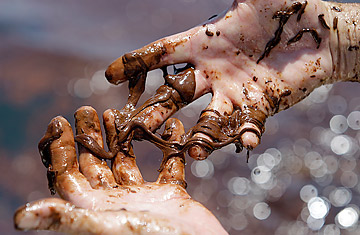
Marine reef ecologist Scott Porter with oil on his hands from the Gulf spill
(2 of 2)
The Obama Administration, which hardly created the MMS mess, has been ham-fisted in fixing it. In the past, critics were keen to note that there were too many oil-industry executives rotating within the agency, so last year President Obama appointed Elizabeth Birnbaum, a longtime environmentalist and congressional aide, to run it. Associates say she maintained a low profile while carrying out some changes, ensuring that miscreants were disciplined or dismissed. But the pace wasn't fast enough — at least in the post-spill hunt for a guilty party. While Obama stepped up to take the blame — "In case you're wondering who's responsible, I take responsibility," he said on May 27 — it was Birnbaum who took the fall. She, along with several prior MMS executives, declined interview requests.
The rush to play dodgeball with blame spattered some. "The oil industry's cozy and sometimes corrupt relationship with government regulators meant little or no regulation at all," Obama also said on May 27 — a claim denounced by Salazar when made by others on Capitol Hill. But the Interior Secretary's defense was sometimes contradictory. When a lawmaker pressed him on whether such spills could be prevented in the future, he insisted, "We are taking action within the Executive Branch to make sure that this problem never occurs again." But when a second lawmaker challenged his ability to offer such a guarantee, he acknowledged that "nothing in life is risk-free." That's true enough, but some risks, as the current disaster shows, are too big to take.
The DNA of MMS may be where its biggest problems are. Much of MMS's leadership over the years has come from Wyoming, which is no accident. Watt, who created the agency unilaterally, was a Wyoming native, and the Cowboy State's clout surged during the tenure of Vice President Dick Cheney, a former Wyoming Congressman and ex-CEO of Halliburton — which was the company working on the failed cement plug on the Deepwater Horizon rig. As with other arcane areas, Washington's ability to regulate offshore drilling is vested in a relatively small community of experts who routinely move back and forth between industry and government, and in this case it was the Wyoming fraternity that did the job.
Such geographical coziness encouraged other kinds of cronyism. George W. Bush's final MMS director, Randall Luthi, now heads the National Oceans Industries Association, a trade group that focuses on "a favorable regulatory and economic environment for the companies that develop the nation's valuable offshore energy resources."
Further evidence of bipartisan culpability is Sylvia Baca, who oversaw MMS in the Clinton era, then spent nearly a decade at BP in senior positions overseeing environmental and safety issues, before returning to Interior under Obama last June as Deputy Assistant Secretary for Land and Minerals Management. The greatest scandal, perhaps, is not that these apparent conflicts of interest have been allowed to go on for so long but that for all this time, they've been an entirely open secret.
"Obviously, we're all oil industry," a recent inspector-general report quoted an MMS official as saying. "We're all from the same part of the country. Almost all of our inspectors have worked for oil companies out on these same platforms. They grew up in the same towns. Some of these people they've been friends with all their life. They've been with these people since they were kids." It may be time, at last, to break up the old gang.
